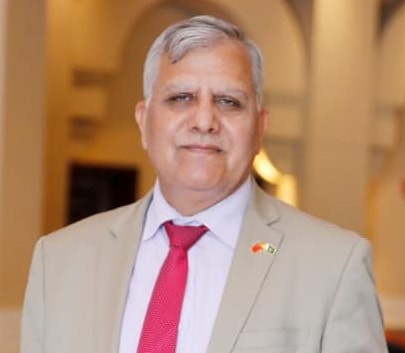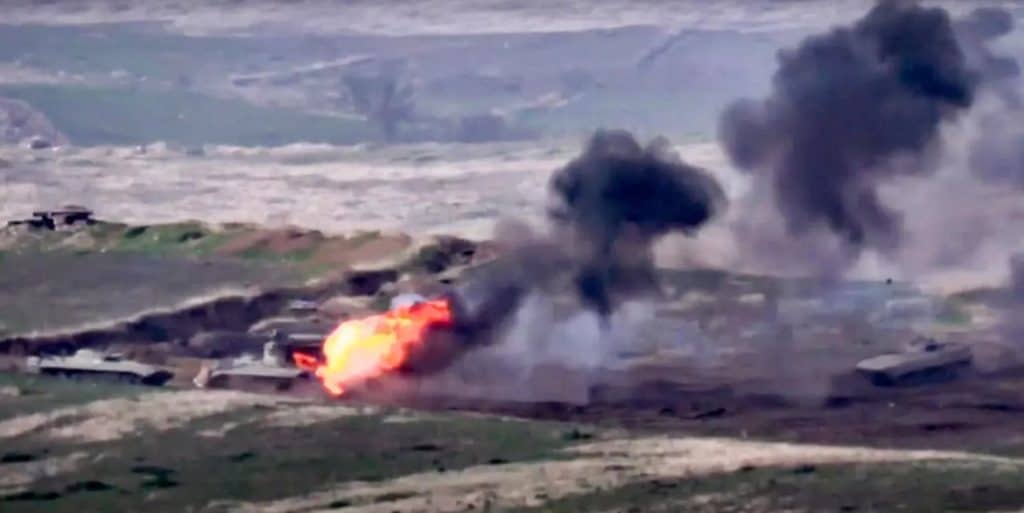By Prof. Engr. Zamir Ahmed Awan
The Azerbaijan-Armenia conflict is a solemn challenge and needed urgent attention; before it spread to a full-fledged war, and engulf the whole region, the International community must move forward proactively to resolve this issue politically and diplomatically up to the satisfaction of both parties.

Nagorno-Karabakh, a mountainous region of about 4,400 sq km, traditionally inhabited by Christian Armenians and Muslim Turks, is rich in natural resources. During the former USSR era, it became an autonomous region within the Republic of Azerbaijan and Internationally accepted as part of Azerbaijan, but the dominant population is ethnic Armenian. The 1990s war displaced an estimated one million people, and about 30,000 were killed after the disintegration of the former USSR. Separatist forces captured some extra territory around the enclave in Azerbaijan in the 1990s war. The stalemate has primarily prevailed since a 1994 ceasefire. Russia has, by tradition, been a close ally of the Armenians: both are Christians.
Although minor clashes were a routine matter and this issue is almost three-decades old, but this time, the use of heavy weapons and heavy causalities has risen the risk of further spread into full-scale war. Interference by some foreign powers like Greek, France, India, etc. supporting Armenia has left no option for Azerbaijan except seeking support from friendly nations.
In 1992, the OSCE Minsk Group was created by the Conference on Security and Cooperation in Europe to encourage a peaceful, negotiated resolution to the conflict between Azerbaijan and Armenia over Nagorno-Karabakh. The Minsk Group consisted of France, Russia, and the United States. The Minsk Group also included the few more states: Belarus, Germany, Italy, Portugal, the Netherlands, Sweden, Finland, Turkey, as well as Armenia and Azerbaijan. The formation of this group was aimed to diffuse the tension, over-come the differences, and resolve the issue amicably through political and diplomatic channels. Unfortunately, no progress or a little progress was made, and conflict has emerged instead of a peaceful settlement.
The UN is keeping distance or not proactively involved in this dispute. However, Russia and France are relatively active to side with Armenia. The US is inactive on this issue since the President Trump came into power in 2016. “The US wasn’t coordinated into that discussion,” said Cavanaugh, the previous US representative to the Minsk Group. “Our view is that this has been a longstanding conflict between these two countries in this particular piece of real estate,” Pompeo told Fox News. “We’re discouraging internationalization of this. We think outsiders ought to stay out. We’re urging a ceasefire. We want them both to back up. We’ve spoken to the leadership in each of the two countries, asking them to do just that.”
The US response seems very vague and formal diplomatic one. It lacks sincerity and deep concerns or willingness to solve the issue. Either the US is not taking pain or giving no importance to this part of the world or really believes that out-side interference may further complicate the issue. However, it is true that the US is reaching close to the presidential election to be held next month, and all energies are spared to win the elections only. Or the US is so helpless that feels better to refrain from any involvement. The absence of the US may favor Armenia, as France and the Russian are in favor of Armenia.
It can be extremely dangerous, if Russia and France will support disproportionately Armenia, then Azerbaijan can get support from its friendly nations. The region may become either supporting Azerbaijan or Armenia, engulfing the whole area into a war zone.
Timely actions are required to de-escalate the tension and reach a ceasefire immediately. The precious human lives must be rescued. The loss of human lives, either Armenian or Azers, is a net loss to humankind and must be averted. The UN should proactively outreach to settle the disputes under the UN Charter. Just must be maintained, and human lives must be respected. While fighting with each other and promoting hate against each other for decades, the two countries may not be left on their own, but a platform purposely established in 1945 after the end of World War II, the UN should full-fill its obligation and mediate between them. However, any friendly nation or big powers may also take appropriate initiatives to cool down both sides and resolve the dispute upto the satisfaction of both sides. A permanent solution is required to save human lives on both sides.
Author: Prof. Engr. Zamir Ahmed Awan, Sinologist (ex-Diplomat), Editor, Analyst, Non-Resident Fellow of CCG (Center for China and Globalization), National University of Sciences and Technology (NUST), Islamabad, Pakistan.
(The views expressed in this article belong only to the author and do not necessarily reflect the editorial policy or views of World Geostrategic Insights).
Image Credit: AP







